[vc_row][vc_column][vc_column_text]
INTRODUCTION TO LEADERSHIP AND MANAGEMENT ONLINE DIPLOMA
What is the Leadership and Management course?
The Diploma of Leadership & Management is for students who want to learn the skills and expertise required to achieve success in roles involving high-level management and leadership responsibilities.
This course will take you to a new level in developing advanced skills of leadership and management.
Including how to plan, organize, implement and monitor the success of teams within an organization. Perfect if you are fresh out of college or looking to fastrack and reebot your career path. You will learn key skills to apply in the workplace and accelerate your progress.
This online Leadership and Management training is designed to provide both employers and employees with the inspirational information they need in order to understand the attributes, behaviors, and practices of a great leader.
The course is designed for those who wish to acquire an in-depth knowledge of leadership and who aim to become more confident and empowered in their team-leading skills.
[/vc_column_text][vc_column_text]
DEMAND
Which countries are on top in online courses?
Australia
Distance education has become an increasingly popular option for Australians who want to head back to school without putting careers on hold, growth that was driven up even more by the economic downturn in 2008 and 2009.
Over the past five years, the online education market in Australia has grown by almost 20% and is expected to be worth an estimated US$4.68 billion this year. Currently, the major players in the Australian market are Kaplan, Seek Learning, and Open Universities Australia, though many smaller schools are also bringing in a fair amount of students as well. Even more, growth is projected in online programmes based in Australia that teach students from Asia, with the international market expected to grow to millions of students during the next 10 years, which if it comes to fruition will make Australia one of the world’s leading providers of online education.
United States
The US is the undisputed leader in online education in the world today, with hundreds of online colleges and thousands of online courses available to students. A 2011 study by the Sloan Consortium found that 6 million students in the US are taking at least one online course, nearly one-third of all those enrolled in higher education. In fact, enrollments in online courses are outpacing those of higher education as a whole, with a 10% increase in online students between 2010 and 2011 compared to a just 2% rise overall. In response, 65% of higher education institutions now say that online learning is a critical part of their long-term strategy.
India
India is playing a major role in the growth of online learning opportunities that are popping up throughout Asia. Over the past few decades, India has developed numerous world-class universities and colleges which are fast becoming destinations for some of Asia’s best and brightest, and their online programmes are experiencing a similar boom.
Part of the explosion of interest has stemmed from economic concerns, as many simply can’t afford to take two or more years off of work to attend a traditional college. Online schools help to solve that problem, and with programmes expecting to bring in a whopping US$1 billion in revenue by the end of the decade, it’s clear that distance learning has staying power in India. While home-based schools are doing well, including the popular IITs and private schools like Sikkm-Manipal University, American universities are also bringing online ed to India, offering courses at MIT, Carnegie Mellon, and Cornell to Indian students.
China
Currently, China is home to almost 70 different online colleges, a number that will likely grow in the coming years in order to meet the high demand for online learning opportunities. China has a long history of distance education, beginning in the 1960s with courses that were delivered via radio and television, but the nation is fast becoming a leader in online education as well.
South Korea
When it comes to advancements in e-learning in Asian nations, South Korea is leading the pack, spurred on by the nation’s strong and growing high-tech industry and widespread high-speed internet access. In recent years, a number of universities in South Korea have begun offering online courses, and the country currently has 17 online colleges, all of which boast state-of-the-art facilities and software.
Malaysia
Malaysia may not be the first place that comes to mind when you think of online education, but the small Asian nation is forging ahead at full speed when it comes to opening up new opportunities for learning online.
One of the nation’s biggest e-learning schools is Asia e University, based out of Kuala Lumpur. It has been a boon for people in under-served areas, many of which have abundant access to the Internet but not universities or higher level degree programmes. And Asia e University doesn’t just reach Malaysians; it offers education to 31 different Asian nations and has partnered with an impressive number of schools to deliver blended and fully online programmes, even developing an MBA programme through the International Business School of Scandinavia in Denmark.
United Kingdom
Online education in the UK has been around for quite some time, but it was only in 2011 that it started to see a real boost in interest. The government’s Online Learning Task Force recommended an investment of £100 million in online education in order to help the nation build its brand, develop better online educational resources, and become a major international player in the distance learning market
South Africa
South Africa is one nation that has begun to capitalize on all the benefits that digital education can offer. They’ve developed nationwide online resources like EduNet and Thutong and offer online courses at both the high school and college levels through institutions all over the country.
In the past few years, the online higher education sector in South Africa has seen steady growth, but the demand for highly qualified teachers, which the country sorely needs, may drive online programmes in teacher training much faster than other sectors. Currently, online education is still in its infancy in South Africa, but the government has demonstrated a dedication to improving and expanding distance learning opportunities and programmes like GetSmarter and UNISA Online are showing that these goals are viable in the current marketplace.
Does doing this course increase your salary?
Upon completion of an online course in leadership, you may be ready to reach executive levels within predominate companies. Your newfound decision-making skills can help you make choices even in difficult situations, which can make you a strong candidate for promotions. This course may also make you eligible for a higher salary.
[/vc_column_text][vc_column_text]
SCOPE
What is the scope of Leadership and Management online course?
1) Online courses: Many online universities and institutes have been offering online courses for graduation, masters’ studies and diploma programs. This is quite beneficial as the student can learn the subject from the comfort of his home. Further, they can take up in their spare time and need not quit their jobs. This way of learning helps them achieve higher educational qualification and in turn get promotions in jobs.
Further, if a person needs to join some course and is lacking some expertise, he can take up college prep courses online to get ready for a regular course.
2) Online revisions: Revision is one of the keys for daily study and exam preparations. The revision does not need a teaching but a constant grading of performance or updating the knowledge.
Performance refers to the ability to recall the subject while updating refers to improving the current knowledge of a topic from the one already had before. Since students might forget what he heard from teachers in school or college, revision helps him recall and remember that teaching. The scope of online education
3) Online exam: Many times students might need to crack competitive exam for an admission in a prestigious university or scholarships. Online exams serve as a mock test or practice papers to get prepared beforehand of the actual exam. It helps them know their ability to score from the knowledge they have and also their exam time utility.
Many students who appear for an exam without some prior practice test fail due to lack of time management or improper comprehension of questions. They do not understand the questions properly or their time to read and answer the questions was not fast enough. So they either make wrong answers be unable to answer all the questions due to lack for time. Online practice test helps them learn how to manage time in the exam hall and also improve the speed of solving the question paper. Thus keeps them ahead of competitors.
4) Online training: Some companies and even schools and colleges may need some training for their employs or students. This training mostly involves field or practical training. But still sometimes a mere demo online by a person performing it on the other side is sufficient. This way of online training reduces travel, time and other expenses.
This is also applicable for some vocational courses or summer programs where students are on holidays and can be asked to learn something.
5) Online library: Not all books are available in the local libraries or on the campus of an institute. Online libraries and other informative services as a part of online education help to solve the problem. One is accessible to an unlimited set of journal or books for references.
[/vc_column_text][vc_column_text]
HISTORY
What is the history of Leadership and management online course?
As the demand for online education increases schools are responding by offering new degree programs every year. The online education space has grown rapidly in recent years, and the variety of programmatic options available can be overwhelming to prospective students.
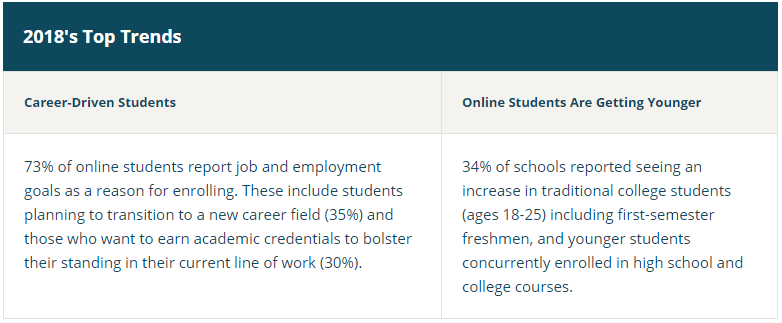
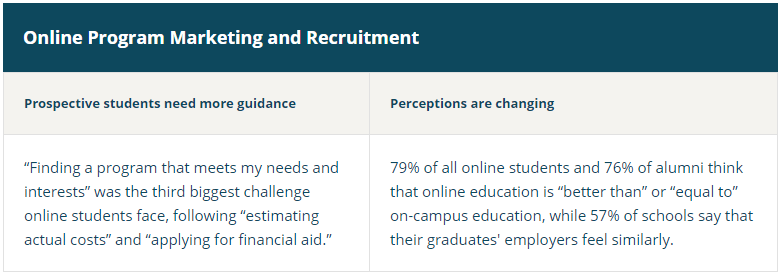
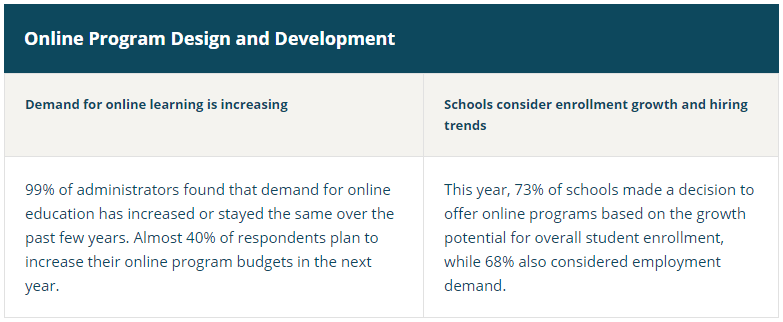
College enrollment overall is in decline, while online enrollments are increasing with each year (2017). Most distance learners enroll at just a few schools, and the majority of these online students (68%) are at public institutions. However, as more online programs become available through more schools, the competition for online students may increase alongside.
It is no surprise that the majority of online students have career goals in mind when they enroll. Many programs are designed to attract working professionals, and career-motivated students at all stages of their professional journey. From freshman to students seeking to change careers to experienced professionals looking to bolster their credentials in their current field, career-motivated students featured prominently in this survey.
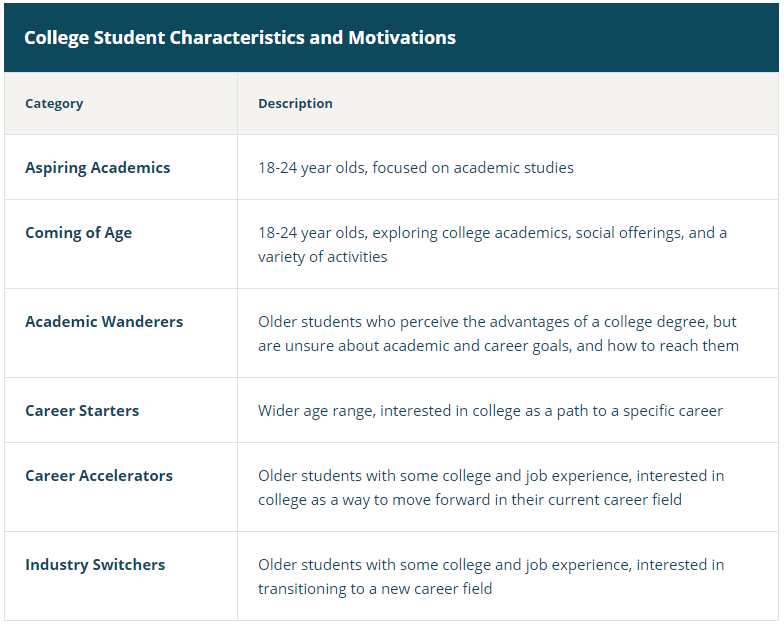
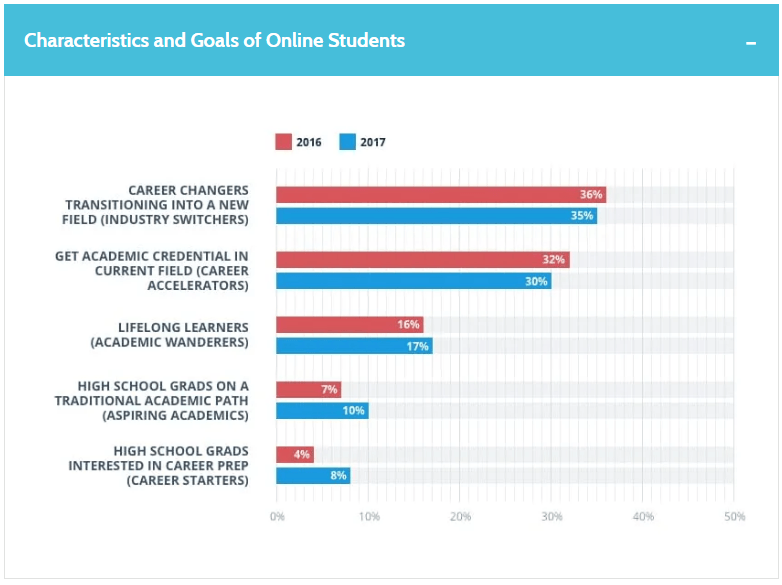
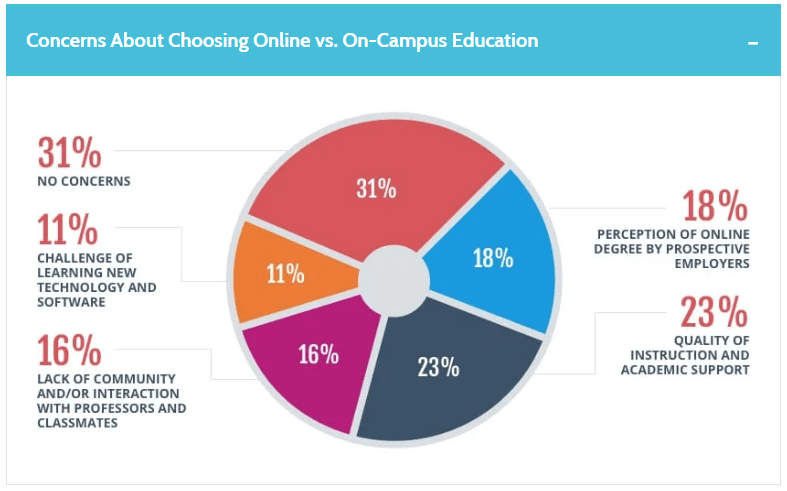
Almost two-thirds (64%) of students who are currently enrolled in an online degree or certificate program report that they visit a campus location either by choice or because their program has an in-person requirement. This is an increase from 52% last year.
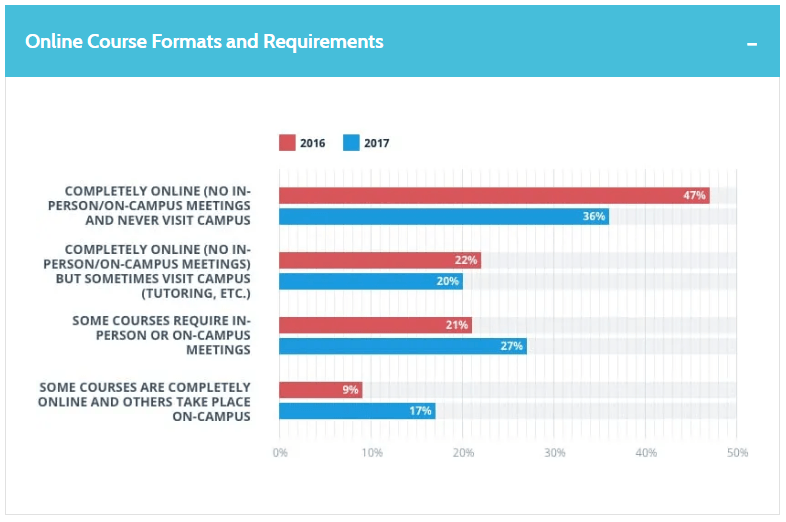
Some students were asked about the use of synchronous tools in their courses – 50% of those currently enrolled in online or blended programs said they have some synchronous component to their courses (i.e., must attend live, scheduled class meetings). While these numbers have decreased somewhat from last year, as the technologies used to initiate real-time meetings at a distance get easier to use and access via learning management systems, live sessions are still common in online courses.
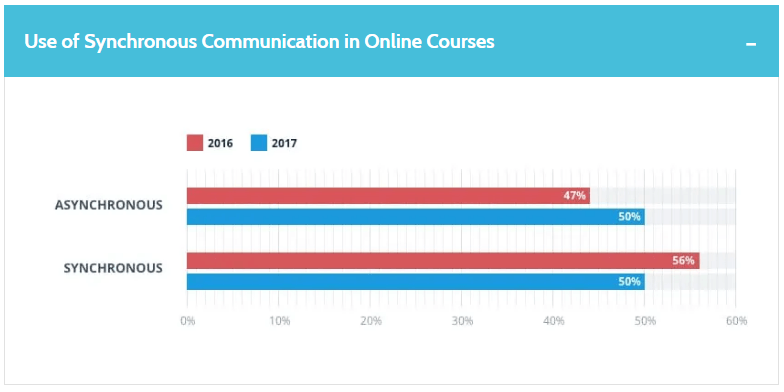
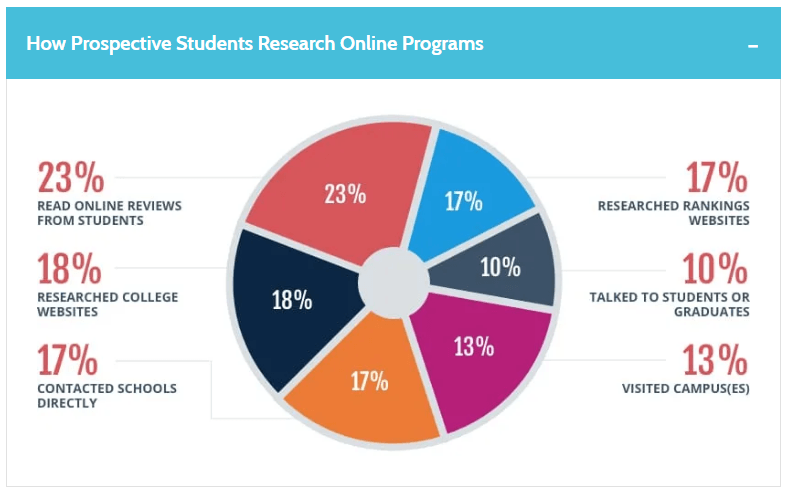
When asked online program graduates about their lessons learned, most expressed regret that they hadn’t done more research. They recommended that those currently considering online education compare more programs, and do more research about costs and financial assistance. These recommendations mirror those reported last year. This year we also saw a small increase in the number of online alumni who wish they had better understood how long it would take to complete their programs.
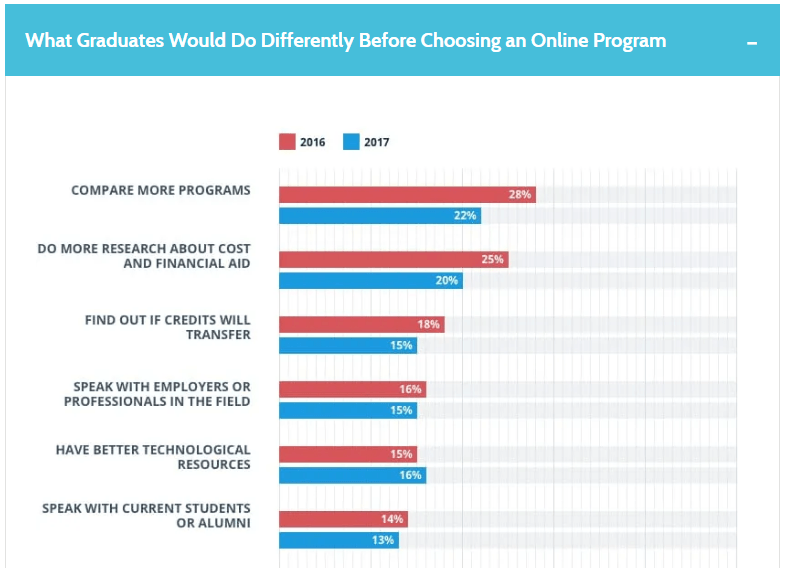

As students research potential online learning options, what are the biggest challenges they face when deciding which program to attend? The top two reported challenges this year were the same as those found last year: estimating annual costs and applying for financial aid and identifying other funding sources. The rest of the list changed, however, as more students struggled to find a program that matched their needs and interests this year.
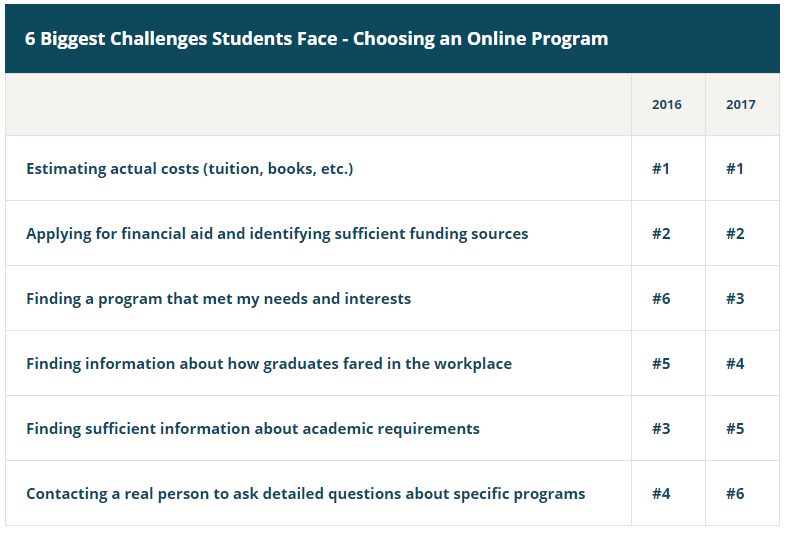
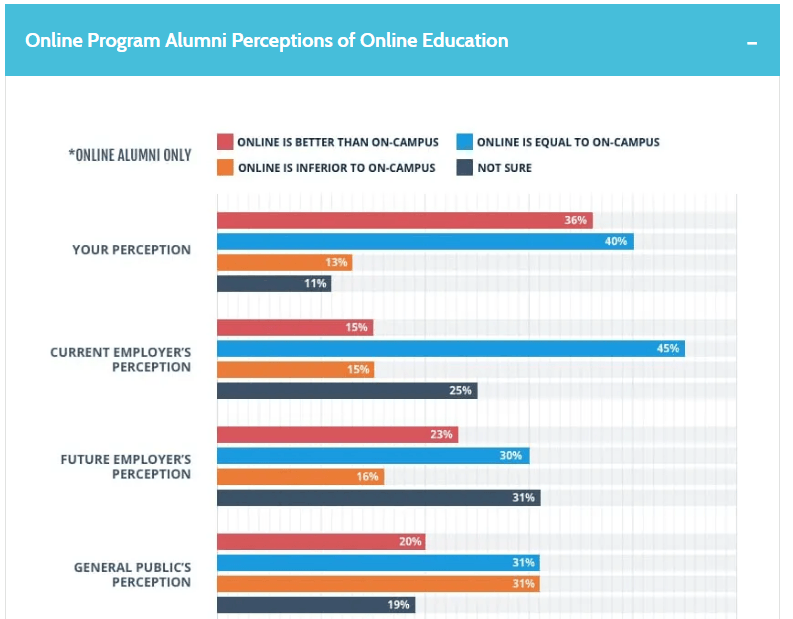
Additionally, some school respondents reported that the majority of employers recruiting and hiring their online graduates see online education as equal to on campus education.
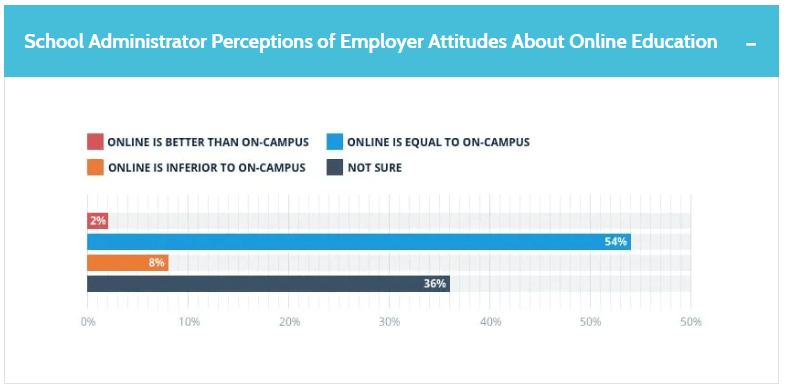
In the survey of online school administrators this year, 76% of respondents said “there is an increase in demand for online courses” at their institutions. An overwhelming majority, 99%, reported that demand is either increasing or has held steady for the past few years.
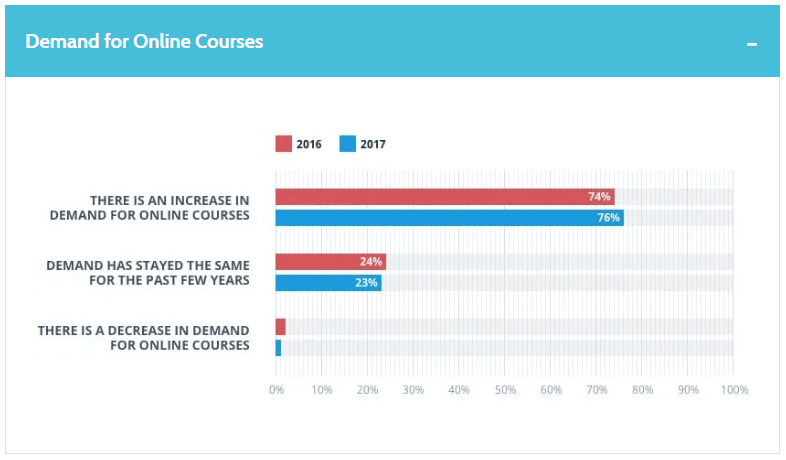
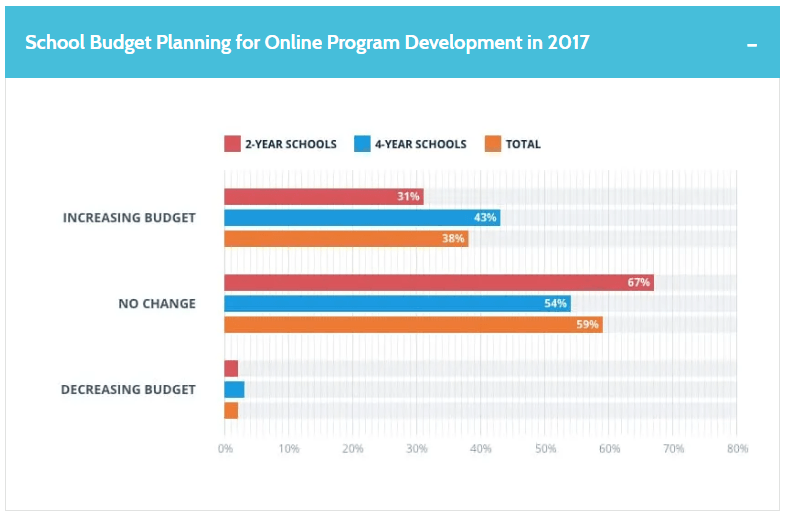
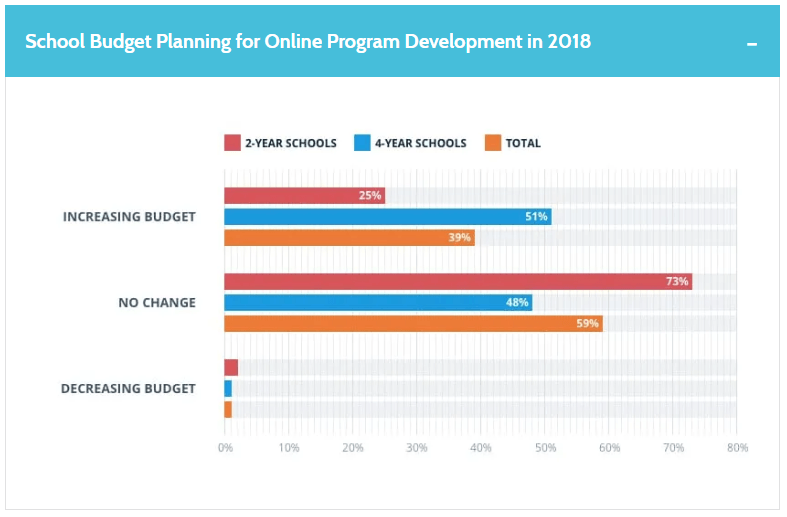
Which programs will have the most students over the next five years? The schools responding to this survey predict that business and related subject areas (e.g., logistics, accounting, management) will have the most growth, followed by healthcare and medical subjects (e.g., medical coding, nursing, healthcare administration), and computer science (e.g., software engineering, cybersecurity, game design).
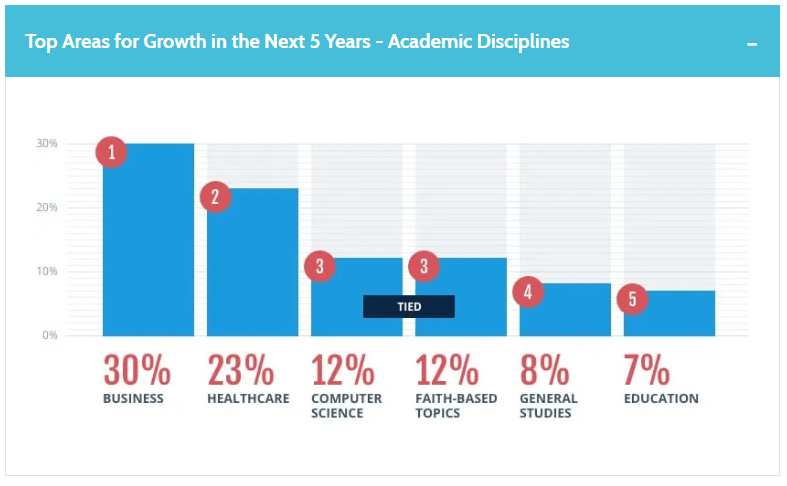
This year, 34% of schools reported that their online students are younger than in previous years, falling into the “traditional” college age range of 18-25, and even younger as high school students take college courses before graduating. Several schools noted that recent high school graduates are entering the workforce while also pursuing a college education.
The trend towards younger online students is not a new development. Recent demographic research found that that 24% of online students in 2012 were 18-24 years old, and that number increased to 44% in 2016. The location trends found in survey responses this year are much newer, however, and may signal a lasting shift. In 2016, 72% of online students chose programs . offered by schools less than 100 miles away.
Location was another trend mentioned by 14% of our school administration respondents.
ONLINE VS ON CAMPUS
Some student respondents provided feedback on why they chose an online format rather than a program offered primarily on-campus or at another physical location. Convenience and scheduling flexibility reasons top the list, followed by employer incentives and the limited availability of programs in a specific area of study.
This year this survey found additional reasons students chose to study online. Some shared that online courses are one way to manage social anxieties related to attending courses in-person or on campus. Other students said that transportation issues make attending in-person classes challenging.
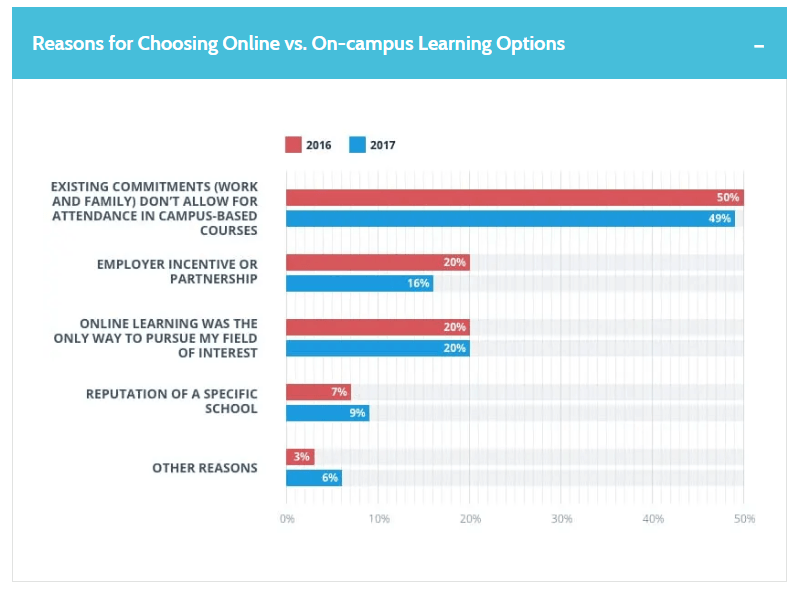
[/vc_column_text][vc_column_text]
BENEFITS
Benefit of Leadership and management online diploma
What is the benefit of the Leadership and Management course?
The following are the benefits:-
- Leadership training courses help build self-confidence and wisdom.
- They empower you to succeed.
- They teach valuable skills.
- They encourage introspection.
- They surround you with other leaders.
- They help lead you to the next level.
- They help you clarify your vision.
- They teach you how to influence people.
- They teach you how to build a team.
What fields or pathways are attached to this course?
The following fields or pathways are attached:-
- Business Manager
- Human Resources Manager
- Sales Team Manager
- Senior Manager (General)
- Branch Manager (General)
- Operations Manager (General)
Am I made for Leadership and Management course?
- The Diploma of Leadership & Management is for students who want to learn the skills and expertise required to achieve success in roles involving high-level management and leadership responsibilities.
- This course will take you to a new level in developing advanced aspects of leadership and management.
What is the eligibility for the Leadership and Management course?
There are no formally prescribed course entry requirements for this qualification; however, the most common pathway into the program is after completion of BSB42018 Certificate IV in Leadership and Management and more commonly will come from existing workers.
Enrollment in this course
- Learners studying this qualification need to have sound communication skills and will undertake a Language, Literacy, and Numeracy test prior to commencing the training if required.
- This program has been designed to be delivered through online delivery and students must be informed of the timetable on enrolment and must maintain the required student study hours.
- Domestic students must pass an ACSF based LLN assessment at Learning (ACSF Level 3+), reading (ACSF Level 3+), writing (ACSF Level 3+), oral communication (ACSF Level 4) and numeracy (ACSF Level 3+) or possess an Australian Year 12 matriculation certificate or an AQTF Certificate IV or above.
- There is no mandatory work placement or work place based assessment requirement for this qualification.
[/vc_column_text][vc_column_text]
COST/FEE
Cost of Leadership and Management online course
ACSE cost for this course is $1,650.
myskills.gov.au (My Skills) cost for the course is $5000.
stanleycollege.edu.au (Stanley College) cost for the course is $13350.
[/vc_column_text][vc_column_text]
OPPORTUNITIES
Opportunities for teacher and students after doing online courses?
TEACHERS
- Online teaching can be a boon for teachers themselves, making it possible for educators, like their students, to have access to the professional resources they need to continue to learn.
- If online professional development is taken seriously and done right, every teacher, novice and experienced, could have the opportunity to learn from the best.
- They can be prepared in situations where they can observe master teachers, working with effective strategies in the most challenging of circumstances, and in discussions with those master teachers, reflect on what works or does not work.
- Online courses also provide a powerful way to enhance teachers’opportunities for quality professional development.
- Some teachers will take online courses or modules to fill in the gaps in their certification requirements; others to address key topics for their continuing growth.
- Online networks can also help support novice teachers, during the stressful early years of teaching, in online learning communities that link them with peers and additional mentoring support beyond those found in their home schools.
Students
- Students can get campus level education from the flexibility of their home.
- They can change the schedule to their own preference.
- With courses from other country universities, they can migrate to those countries once they have completed the course.
- Some colleges or institutes give installment payment option like ACSE which helps students a lot.
[/vc_column_text][/vc_column][/vc_row]





